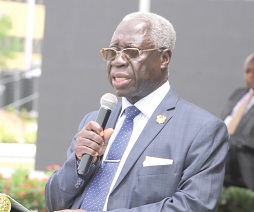
Public sector reform implementation so far
The quest to deliver quality services to citizens has been of major concern for successive governments. Many Ghanaians have expressed their frustration about the working culture of public sector institutions, particularly with the delays in the delivery of services to the people.
This article looks at the development of the Public Sector Reform for Results Project (PSRR) and its implementation status.
Advertisement
In line with Article 36 (5) of the 1992 Constitution, in 2017, the government initiated the Coordinated Programme of Economic and Social Development Policies (2017-2024), in line with the preparation of the Medium-Term National Development Policy Framework (2018-2021) to guide ministries, departments and agencies (MDAs), and metropolitan, municipal and district assemblies (MMDAs).
The policy framework concentrated on improving leadership for effective management of public policy and administration.
Delivery
Regarding the improvement of service delivery among public sector institutions, the government developed the National Public Sector Reform Strategy (NPSRS) 2018-2023 by reviewing the previous reforms and introducing a wide range of changes and innovations.
The strategy was developed by a team of civil servants, academia and technical experts under the supervision of the then Senior Minister, Mr Yaw Osafo-Maafo, and coordinated by the Chief Executive Officer (CEO) of the Public Sector Reform Secretariat (PSRS), Thomas Kusi Boafo.
The goal of the NPSRS (2018 – 2023) was to achieve “enhanced public service delivery to citizens and the private sector”.
Based on the successful launch of the NPSRS (2018-2023), the government initiated a project in collaboration with the World Bank Group to partially support the implementation of the NPSRS with a credit facility of US$32million for the development and implementation of a four-year PSRRP (2019-2023).
The project objective was, “Improving efficiency and accountability in the delivery of selected services by selected entities”.
Beneficiary entities
The 13 beneficiary entities are the Driver and Vehicle Licensing Authority (DVLA); Passport Office, Births and Deaths Registry; the Ministry of Transport; the Ministry of Foreign Affairs and Regional Integration; the Ministry of Environment Science Technology and Innovation; the Ministry of Local Government Decentralisation and Rural Development, and the Office of the Head of Civil Service (OHCS).
The rest are the Public Services Commission (PSC); the Commission for Human Rights and Administrative Justice (CHRAJ); the Monitoring and Evaluation (M&E) Secretariat; the National Information Technology Agency (NITA) and the Public Sector Reform Secretariat (PSRS), the implementing agency.
The selected entities developed their own proposals for the implementation of their reform activities. Following the proposals submitted in 2020, it was imperative to procure vehicles, motorbikes and ICT equipment to enable them improve on their service delivery and enhance their systems and processes, especially at the local level.
The Births and Deaths Registry received 10 double cabin pickups and 120 motorbikes to expand the coverage of their services and facilitate mobile registration of births and deaths across the country.
These have increased their registration process across the country with the year 2020 recording 68 per cent, with 70 per cent achieved in 2021.
Again, six of the 12-seater mini buses procured for the DVLA were fitted with licensing equipment to support the innovative Tertiary Drive (TERTDRIVE) programme, with 2,319 students registering and writing the driver licence theory test, and 1,996 passing and having their licences 2021. CHRAJ had 19 desktop computers, 19 laptop computers, 25 printers, 23 photocopy machines, 18 projectors, 20 digital voice recorders, 24 scanners, 20 internet routers and others, to help in revamping its ICT systems its offices across the six newly created regions.
The OHCS received third party internet service, including 30 internet routers for their offices, to improve the processing of staff data through online recruitment and online promotional interviews, including training programmes, in the year 2020 and 2021.
The reforms initiated are improving the delivery of services to the citizens. The PSRRP would largely support the advancement of modern technology on the systems, processes and procedures of selected entities for easier and faster access to service delivery to citizens across the country.
The writer is a Communication Specialist for the PSRRP/ PRO, Office of the Senior Presidential Advisor. E-mail: [email protected]



